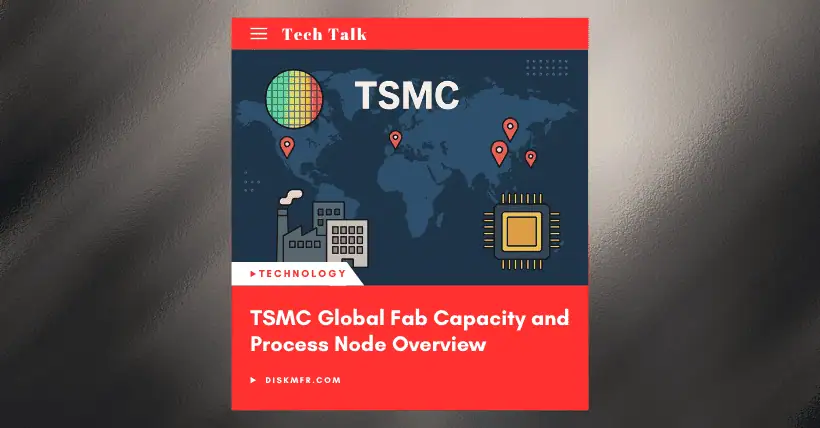TSMC’s process evolution history, from 3μm to the current 3nm.
TSMC’s 3nm (N3) is currently in mass production. Here, 3nm refers to an equivalent node, not the actual physical node. The 2nm (N2) node is planned for mass production in 2025. The generation after that is the A16 node, which is 1.6nm.
Based on this, we provide a detailed introduction to the process and production capacity of TSMC’s various fabs.
01
12-inch wafer fabs – TSMC Global Fab
Taiwan region:
Fab 12 (Hsinchu): Mass producing 20-7nm processes, capacity can be expanded.
Fab 12 is an important production base in the Hsinchu Science Park, focused on 20nm to 7nm mass production, meeting high-end chip demands like smartphones and high-performance computing (HPC). Initially focused on 16/20nm (e.g., Apple A9 processor), later upgraded to 7nm (e.g., Apple A12, AMD Zen 2 architecture CPU).
Fab 14 (Tainan): Expanded as a specialty process production base, supporting mature processes of 28nm and above.
Fab 14 is a core base for mature processes, focusing on 28nm and above, and enhancing specialty processes (e.g., RF, high voltage, embedded memory), serving automotive electronics, IoT, and industrial control.
Specialty processes include:
- 28nm high-voltage process (automotive power management chips)
- 40nm RF-SOI (5G RF front-end modules)
- 55nm embedded flash (smart cards, sensors)
Fab 15 (Taichung): Began production in 2012, current monthly capacity approx. 166,000 wafers, mainly 20/16nm.
Fab 18 (Tainan): TSMC’s most advanced production base, includes 8 plant sections (P1–P8):
- P1–P3 mass producing 4nm
- P4–P6 for 3nm (mass production in 2024)
- Current P1–P6 total monthly capacity approx. 120,000 wafers (4nm/3nm)
- P7–P8 planned for 3nm expansion
Fab 20 (Hsinchu Baoshan): 2nm R&D and mass production base, trial production capacity to reach 3,000–3,500 wafers/month in 2025, target of 120,000 wafers/month by end of 2026.
Nanjing Pukou (Mainland China):
Fab 16: Started production in 2018, monthly capacity 24,000 wafers, mainly 16/12nm.
- Phase 1 expansion (Project 1A): 16nm + 12nm process mix, mainly for CPU, GPU, high-end SoC production.
- After expansion in October 2022, annual capacity increased from 300,000 to 378,000 wafers.
- Phase 2 expansion (Project 1B): 28nm process, targeting mature node demand, including IoT, automotive electronics, and industrial chips.
- After acceptance in October 2024, additional 600,000 wafers/year capacity.
Phoenix, Arizona (USA):
Fab 21 (Phoenix): 4nm (N4/N4P) chips to enter mass production by end of 2024, current monthly capacity 10,000 wafers, plan to expand to 3nm in 2028 and 2nm in 2030.
- Phase 1 (P1A + P1B) total target capacity: 24,000 wafers/month.
Japan Kumamoto:
JASM Fab 1: To mass produce 22/28nm and 12/16nm by end of 2024, planned monthly capacity 55,000 wafers.
Fab 2 (6/7nm): Planned to start production in 2027, combined capacity over 100,000 wafers/month.
02
8-inch wafer fabs (mature and specialty processes)
1: Taiwan region:
Fab 3 (Hsinchu): Process nodes: 0.15μm and above mature processes
8-inch fab, mainly for analog chips, power management chips, and other specialty products.
Fab 5 (Hsinchu): 0.25–0.15μm mature processes
8-inch fab focused on automotive electronics, IoT, and other mid/low-end chip manufacturing.
Fab 6 (Tainan): 0.18μm and above mature processes
8-inch fab supporting mixed-signal, RF, and other specialty process needs.
Fab 8 (Hsinchu): Process nodes: 0.18μm and above mature processes
8-inch fab serving consumer electronics and industrial control sectors.
2: Mainland China:
Fab 10 (Shanghai): Process nodes: 0.35μm to 0.11μm mature processes
8-inch fab mainly producing analog chips, sensors, etc., supporting automotive and consumer electronics.
3: Singapore:
SSMC (joint venture in Singapore), total monthly capacity exceeds 500,000 wafers.
4: USA:
Fab 11 (WaferTech): Started in 1998, producing 0.25–0.15μm processes, capacity undisclosed.
6-inch wafer fab:
Fab 2 (Hsinchu): Producing processes above 0.15μm, capacity undisclosed.
03
Future capacity plans and expansion projects
Taiwan:
- 2nm (N2):
- Hsinchu Fab 20 and Kaohsiung Fab 22 advancing simultaneously, combined monthly capacity to reach 50,000 wafers by end of 2025, expanding to 120,000–130,000 wafers/month by end of 2026.
- 1nm (A14):
- Tainan Shalun Fab 25: Planned construction of six 12-inch production lines, expected to begin trial production after 2028, aimed to be the world’s first 1nm mass production base.
Phoenix, Arizona (USA):
Planned additional $100 billion investment to build 3 new fabs (including 2nm), 2 advanced packaging plants, and an R&D center. Total investment: $165 billion.
Japan: Fab 3 (sub-1nm) expected to launch after 2030.
Germany: Planning a car chip plant in cooperation with Bosch and others.
04
Capacity utilization and market demand
TSMC’s 2024 capacity utilization exceeds 95%.
2025–2026 capacity already booked.
AI/HPC: CoWoS advanced packaging demand surging, 2025 capacity expected to reach 800,000 wafers/week.
Consumer electronics: Ongoing orders for Apple A18 (3nm), AMD CPUs (4nm).
Automotive electronics: Japan plant focused on automotive chips, monthly capacity 55,000 wafers.
TSMC’s effective capacity is currently about 1.3 million wafers/month, or 16 million wafers/year.
05
Summary
The majority (70%–80%) of TSMC’s capacity is located in Taiwan. The company is now expanding capacity into the US, Japan, and Europe.

Disclaimer:
- This channel does not make any representations or warranties regarding the availability, accuracy, timeliness, effectiveness, or completeness of any information posted. It hereby disclaims any liability or consequences arising from the use of the information.
- This channel is non-commercial and non-profit. The re-posted content does not signify endorsement of its views or responsibility for its authenticity. It does not intend to constitute any other guidance. This channel is not liable for any inaccuracies or errors in the re-posted or published information, directly or indirectly.
- Some data, materials, text, images, etc., used in this channel are sourced from the internet, and all reposts are duly credited to their sources. If you discover any work that infringes on your intellectual property rights or personal legal interests, please contact us, and we will promptly modify or remove it.








